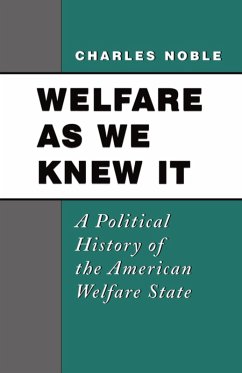Compared to other rich Western democracies, the U.S. does less to help its citizens adapt to the uncertainties of life in a market economy. In Welfare As We Knew It, Charles Noble offers a groundbreaking explanation of why America is so different. Drawing on research in comparative politics, history, and sociology, he demonstrates that deeply-rooted political factors, not public opinion, have limited what reformers have been able to accomplish. Rich historical analysis covering the Wilson administration to the present is followed by a provocative look at future U. S. social policy. Reformers who want government to do more, Noble argues, must refocus their activities on political and institutional change, such as campaign finance and labor-law reform, if they hope to succeed. Taut, comprehensive, and accessible, with a much-needed international perspective, this book will change the way we look at U. S. social policy.
Dieser Download kann aus rechtlichen Gründen nur mit Rechnungsadresse in A, B, BG, CY, CZ, D, DK, EW, E, FIN, F, GR, HR, H, IRL, I, LT, L, LR, M, NL, PL, P, R, S, SLO, SK ausgeliefert werden.

